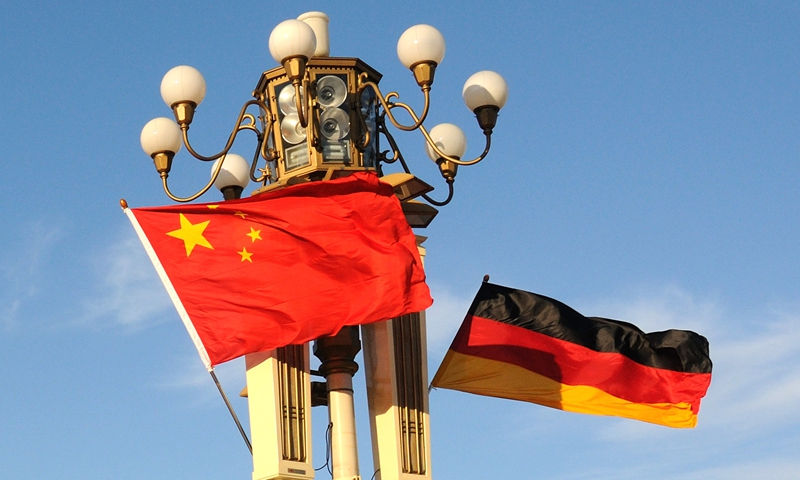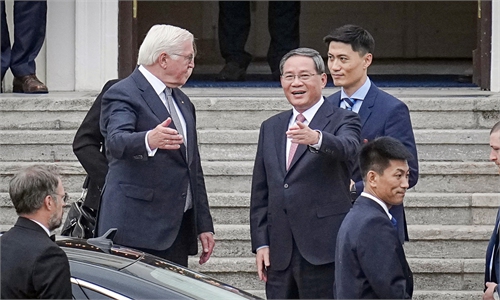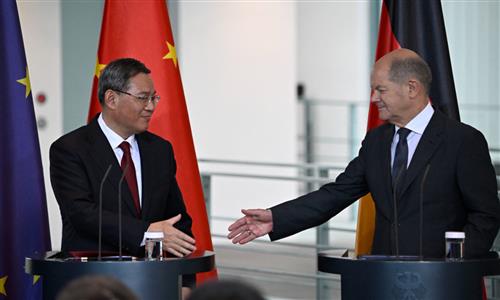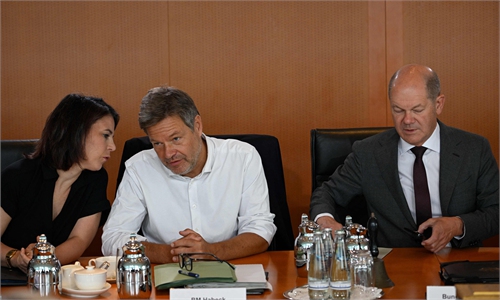
China Germany: Xinhua
China's foreign ministry criticized Germany's "Strategy on China" on Friday, stating that it is counterproductive and risky to use "de-risking" and "reducing dependence" as a pretext for engaging in competition, protectionism, and politicizing normal cooperation with an over-stretched national security concept.
Analysts and industry insiders also pointed out that "de-risking" is certainly not conducive to bilateral cooperation. China-Germany cooperation is a win-win situation and there should be no obstacles to it.
Germany adopted its first comprehensive "Strategy on China" on Thursday, in which China is seen simultaneously as a partner, competitor and systemic rival.
"De-risking is urgently needed. However, we are not pursuing a decoupling of our economies," read the strategy paper.
German Chancellor Olaf Scholz also tweeted on Thursday that "our aim is not to decouple. But we want to reduce critical dependencies in future."
In response, the Chinese Ministry of Foreign Affairs said on Friday that drawing lines based on values and ideologies and advocating for competition among systems, interests, and values go against the current global trend and will only worsen the divisions in the world.
"Under the current complex and volatile international situation, it is hoped that Germany will view China's development in a comprehensive and objective way, formulate rational and pragmatic policies toward China, join hands with China to meet global challenges, and contribute more stability and positive energy to world peace and development," Wang Wenbin, a spokesperson of the Chinese foreign ministry, said on Friday during a regular press conference.
A staffer at a Germany-invested company in China told the Global Times on Friday that they have been preparing for the worst since the German government changed its attitude toward China.
"De-risking seems like a different word from decoupling. But I think it's hard to define in practice. And the operations and investment of German companies in China will be affected as a result," said the staffer, who declined to be named.
Another employee, who also works at a German enterprise in the energy sector in China, told the Global Times that in an era of globalization, Germany and China are closely related in terms of global supply and industrial chains. De-risking or decoupling is not realistic and will definitely hurt German companies.
"In fact, the best investment that German companies can find right now is in China," the employee noted.
Many of the challenges and problems facing Germany today are not of China's making, the Chinese Embassy in Germany said in a statement posted on Thursday.
"China always attaches importance to developing relations with Germany and is willing to work with Germany to implement the outcomes of the seventh China-Germany intergovernmental consultation and deepen exchanges and practical cooperation in various fields. However, to develop bilateral relations, we must uphold the basic principles of mutual respect, equality and mutual benefit," read the statement.
China has also formed a long-term cooperative partnership with Germany in high-tech industries and competitive industries, Chen Jia, an independent analyst focused on global strategy, told the Global Times.
"The bilateral manufacturing industrial chain has been deeply integrated, especially in the high-precision processing of industrial equipment, parts and materials, and has formed an efficient division of labor cooperation mechanism, jointly building a global advantage in the industrial chain," said Chen.
"De-risking" or "decoupling" will only benefit competitors in other parts of the world, Chen noted.

Aerial photo shows China-Germany Innovation Park in Taicang, east China's Jiangsu Province, Oct. 31, 2019. Taicang has been making great efforts to improve business environment through facilitating administrative procedures for enterprises including registration, project approval and tax registration in recent years. As a result, Taicang has attracted investment of over 1,500 foreign enterprises. Photo: Xinhua
The trade in goods between Germany and China reached 298.9 billion euros ($335.7 billion) in 2022, according to Germany's Federal Statistical Office (Destatis).China was Germany's most important trading partner in 2022 for the seventh consecutive year, said Destatis.
In fact, Germany admitted in its Strategy on China paper that China is Germany's largest single trading partner.
"But whereas China's dependencies on Europe are constantly declining, Germany's dependencies on China have taken on greater significance in recent years," the paper said.
Analysts pointed out that it is Germany that should consider why its share of China's foreign trade has decreased while that of emerging markets, such as ASEAN members, Latin American and African countries, has increased.



